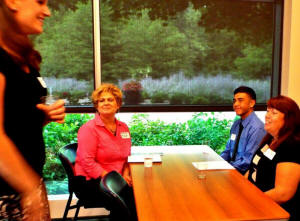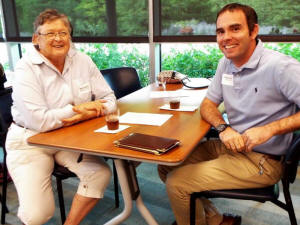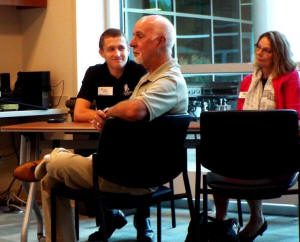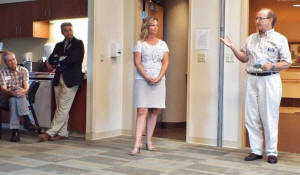|
 The LLCEO program helps create that connection for those with an
entrepreneurial spirit. The LLCEO program helps create that connection for those with an
entrepreneurial spirit.
On August 2nd, as thousands of people were enjoying all the hoopla
at the Logan County Fair, across the street in a meeting area of
ALMH a much quieter gathering took place. It was the second kick-off
of the Land of Lincoln Creating Entrepreneurial Opportunities.
The LLCEO program fosters and tools local high school students
interested in entering the business world. Local business persons
are the core provision to their learning experience.
The first hour of the kick-off focused on the sponsors and potential
sponsorship in the program.

Bridget Schneider
with Level 4 Advisory Services visits with a new student and his
mom.

Kristi Powell, site
administrator for Heartland College (center) and Tom McLaughlin of
Lincoln College visit. Both colleges are sponsors.


Lincoln Mayor Marty
Neitzel and City Administrator Clay Johnson are fully behind the
program, as is the Logan County Board.
The second hour was dedicated to introducing this year's parents and
15 new students to the program.
The groups were addressed by LLCEO Board members April and Patrick
Doolin, John C. Bury of the Springfield SCORE, and LLCEO program
facilitator Jason Mauhar.
Score sponsored a buffet for the evening program.
Patrick Doolin opened by saying that last year was a learning
experience for the board and facilitator, they were learning right
along with the students during the program's inaugural year. And, he
emphasized, "It was a phenomenal year."
Recognizing Evan, a student from last year, Doolin noted that Evan
has become more professional and business focused today than he was
a year ago.
"Totally," Evan agreed.

Evan Miller (black shirt), LLCEO
class of 2015/16.
Doolin illustrated the need to introduce young people to the
business world through practical experiences, "You can't learn a
sport by reading a book. You can't learn to be an auditor without
doing some auditing. And yet, so much of business is taught in the
form of a text book."
He said the interest in bringing this program to Lincoln was "not
just to give students a leg up in the world, but to give them a leg
up in our community.

"When students come into the class at the beginning of the year they
know very little about our business community. They don't know what
businesses are here. They don't know what products and services are
made here. And, they really don't know how to interact or how to
meet those business people.
"And yet, they have that entrepreneurial spirit in them that says
they want to do something like that.
"How do we foster that?
Doolin said in this program students are first introduced to problem
solving, and they are also immersed in diverse opportunities:
- They meet business people.
- Business people come talk to the class.
- Students tour manufacturing plants.
- They learn how different businesses work.
Last year encompassed 40 - 50 different business site visits
and about the same number of guest speakers came in.
Doolin said, "The highlight of the year was the LLCEO Trade
Show. All students had begun their own real business using real
money and pitched it in a trade show format.
"For a first show, it was very well attended, including a
special guest, Gov. Bruce Rauner. The board was very proud of
the students performance and "they actually sold some stuff that
night, some to the Governor." Doolin said.
[to top of second column] |

Doolin reflected that in the course of the school year,
students go from - coming in green not knowing how to introduce
themselves, how to make eye contact, how to shake hands, show up
on time... - to here they are, running their own business nine
months later.
"Was it easy? No. It is a year of learning failure and success.
The students are challenged," Doolin said.
He said that program facilitator Jason Mauhar could be found
periodically gritting his teeth not to say anything, (rather)
allowing the students to figure it out for themselves, which was
teaching the students how to problem solve.
The moments of anguish must have been off-set by other
satisfaction, as Mauhar continues with the program this year.
[You can see Mr. Mauhar's take on the dynamic program in a
separate article.]
Doolin said, "The CEO program connects students with businesses,
the business managers often even help mentor the students.
"There is a lot of support for students, so much that they can't
fail; if they do fail they are learning from the failure."
SCORE, which is a national association of retired business
professionals resourcing volunteers to mentor start-up
businesses, also supports the CEO program. John Bury, who is
from Jacksonville, is the Chairman of the Springfield SCORE
Chapter. He said that SCORE and CEO missions are alike in that
they both have a mission to support local, small business
economy.

Left to right:
Sponsor Clyde Reynolds of Keystone Risk Management, Patrick and
April Doolin, drivers bringing the program to Lincoln/Logan County;
and John Bury of SCORE speaking.
American communities depend on small businesses to drive their
economy. According to the Small Business Administration "Small
businesses make up: 99.7 percent of U.S. employer firms, 64 percent
of net new private-sector jobs, 49.2 percent of private-sector. In
2016, the SBA stated that "Small businesses provide over half the
jobs in the United States, and as such, really do drive the nation's
economy."
SCORE has been involved with CEO programs in Morgan, Scott, Sangamon
Counties, and now the Land of Lincoln.
Bury said, "I'll tell you, every time I meet with the CEO students
it is just a pleasure to see the professionalism, the presence to
talk to you and just converse. (They develop) "interesting skills
that I wish that I had as a young man."

Doolin says, "The CEO program encourages the entrepreneurial spirit.
Students see that it is not all about making money. It's not all
about what the world deems as success. It is about trying things and
learning from your failures; being connected to people in such a way
it helps you change course mid-way without having to fall of the
edge."
The program takes a lot of planning and support by parents, school
administrators, sponsors, businesses and others, but unequivocally
after the first year's results, Doolin states, "It is worth it!"
|
Funding
The CEO program
does not use school tax dollars. LLCEO is self-supporting
through individual and business donations. The CEO board
encourages community support:
-
Investors
pay $1,000 a year. A three-year commitment is requested.
-
Contributions may be tax deductible, as LLCEO is a
501(c)(3) not for profit organization.
-
Funds are
used to pay the facilitator and some of the class
expenses.
More funds
equate to more things to put in front of the students to
experience and covers expenses such as travel for field
trips. |
The program is open to junior and senior students at Lincoln,
Mount Pulaski, Hartsburg Emden and to a number of other collar
county high schools. This year's class of 15 includes two Olympia
students.
Admission to the program is by application made in late winter for
the following Fall and Spring semesters.
Student applications are reviewed and chosen based on merit through
an independent board using a blind review process. Student names and
identity are not known to the reviewers.
Students who are interested should go to the their school guidance
office to request an application, or go to the LLCEO website.
[Jan Youngquist]
For more information on how to
support, donate or participate with the local program, see
www.llceo.com
The program was developed by central Illinois businessman, Craig
Lindvahl, and began in Litchfield. Midland Institute for
Entrepreneurship oversees the launch of each new program location.
See more at
www.midlandinstitute.com
From LDN archives:
 |